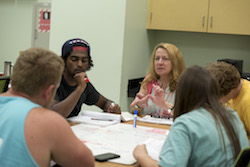Where can I find good activities for small group discussions?

Nearly all research-based teaching methods in physics involve some kind of small group discussions of challenging conceptual activities. Research suggests that it's not enough to tell your students to work in groups unless you also have high quality research-based activities (Cummings et al. 1999). Thus, finding good activities is an important component of making small group discussions work in your class. This recommendation includes links to collections where you can find activities to use in your class, whether you are just trying to incorporate more small group activities, or are using a particular approach such as SCALE-UP, Peer Instruction, CAE Think-Pair-Share, Technology-Enhanced Formative Assessment, and teaching with clickers.
Collections of research-based conceptual activities to use for small group work:
- Tutorials are guided-inquiry worksheets for use in small groups, typically in a recitation section. Instructors circulate through the room and engage groups in Socratic dialogue, leading students to discover the answers to their own questions. There are many types of tutorials for different goals and topics at all levels of physics:
- Introductory Physics: Tutorials in Introductory Physics, Activity-based Tutorials, and Open Source Tutorials
- Introductory Astronomy: Lecture-Tutorials for Introductory Astronomy
- Intermediate Mechanics: Intermediate Mechanics Tutorials
- Upper-division E&M: CU upper-division E&M tutorials
- Quantum Mechanics: Quantum Interactive Learning Tutorials (QuILTS) and CU upper-division quantum tutorials
- Thermodynamics and Statistical Mechanics: Tutorials in Thermal & Statistical Physics
- Cooperative group problem-solving with Context-rich problems involves students working in small groups on short realistic scenarios giving them a plausible motivation for solving the problem; more complex than traditional problems, reflecting the real world, and may include excess information, or require the student to recall important background information.The University of Minnesota has created an online archive of context-rich problems, where you can find problems for many topics in introductory mechanics and electromagnetism.
- Tasks Inspired by Physics Education Research and Ranking Task Exercises in Physics are short activities that help students apply concepts and address known difficulties. Activities are designed so that they cannot be solved using "plug-and-chug." They can be used for in-class group discussions, homework assignments, quizzes, or test items, and are constructed based on research into student ideas.
- Thinking problems are a collection of homework problems, clicker questions, and exam questions. Includes estimation problems, ranking tasks, and problems designed to help students connect mathematical and conceptual reasoning and relate physics to the real world.
- PhET Interactive Simulations and Physlets: These and other simulations are designed for conceptual learning and can be used for small group activities or homework in SCALE-UP. Both come with activities for small group work.
- Just In Time Teaching (JiTT) is a technique where students answer questions online before class, promoting preparation for class and encouraging them to come to class with a "need to know." Instructors use the responses to fine tune their presentation and incorporate student quotes into the class. The JiTT website has a large collection of JiTT activities for many topics in physics and for many other disciplines.
Collections of multiple-choice conceptual questions for small group discussions:
- Our recommendation on finding good questions to use with clickers or Peer Instruction has a long list of collections of multiple-choice conceptual questions for use with Peer Instruction, CAE Think-Pair-Share, Technology-Enhanced Formative Assessment, and teaching with clickers.
Image ©Stephanie Schulz/ or Chandler Prude – Texas State University CCBY
 Add a Comment
Add a Comment


